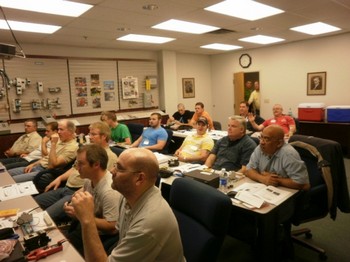All commercial and industrial buildings are energy supply spaces that must be maintained and regulated at all times. Schools, hospitals and malls are examples of buildings that require someone to regularly maintain the energy room to keep the building safe and running efficiently. Boiler operators also help monitor, maintain and repair certain types of equipment contained in the boiler room.
In order to become certified in boiler operation and become a professional in the field, there are several education and training courses that must be completed. Below is a brief overview of how someone with enough motivation and ambition can launch a successful career operating boiler rooms.
Early Education
The first step in your education is earning a high school diploma or its equivalent, such as a GED. During your high school career, you should focus your efforts specifically on science and math classes. Some examples are geometry, algebra, physics, and chemistry. Each of these courses will help lay the foundation of knowledge you need to complete the required boiler maintenance class before you start your career.
Additional skills and courses that may not be required but can be of benefit to individuals wishing to work in this field are:
- in English language
- Interpersonal communication
- Computer Science
It is essential that a boiler operator be able to communicate effectively with large numbers of people, and some people are surprised at how beneficial it is to have good skills with people.
College foundation
For many boiler operators, it is required to earn an Associate degree. This is often a two-year degree that can be earned from any community college university in your area. Specific study programs include welding technology, HVAC, and stationary engineering. During your studies, you will be trained and gain knowledge in repair of burners, combustion processes and boiler systems. You may also benefit from a drawing or computer design course, as many systems are run electronically and new technologies are developed every day.
Work training
The next step to becoming a boiler operator is apprenticeship. An internship is a period of four to five years, during which you work directly under an individual who is certified in operating and maintaining boiler rooms. During this time, you gain valuable work experience and knowledge that is difficult to convey in the classroom. The benefit of having an apprenticeship is that you get paid even as you gain the education and experience necessary for your career. While it may seem like the education and training period to become a boiler room operator is long, it is important to remember that the longest apprenticeship still allows you to earn a salary.
Become a Licensee
In some states, each boiler operator is required to be licensed. While licensing requirements will vary from state to state, you can expect some sort of mix of experience, education, and passing a competency exam as a requirement to become a licensed boiler operator.
Once you acquire a license, the knowledge doesn’t end. You will have the opportunity to advance your career by obtaining various levels of licenses in your specialization, and there are no limits to where you can go at this point.
Image Credit: Americantrainco.com








